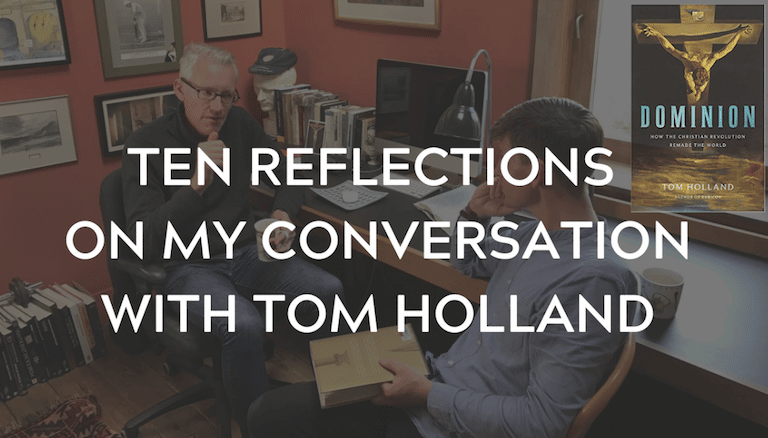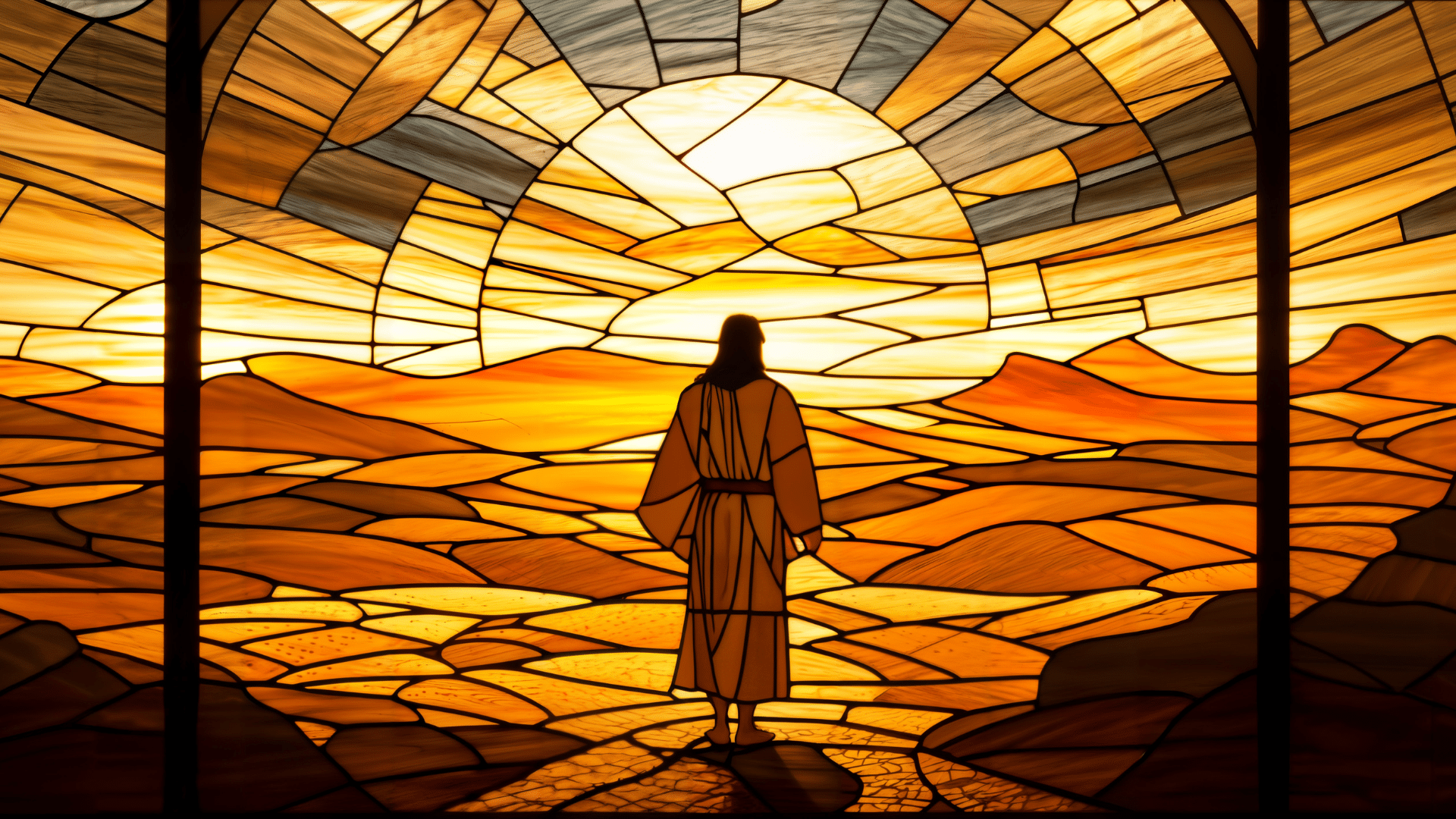Considering Tom Holland’s Dominion — part 2

20th October 2019 // By Glen Scrivener
PART TWO
Last week I interviewed Tom Holland about his new book, Dominion, The Making Of The Western Mind. If you haven’t seen the interview, do watch below.
Below are 6 reflections on the book and on our interaction. (Here are parts one and three).
You can read my first 6 reflections in full here. In outline they are
Tom Holland gets the ethic of the cross.
Tom Holland gets the theology of the cross.
Dominion is a continuation of In The Shadow of the Sword
Dominion is the perfect contrast to In The Shadow of the Sword.
There is a huge gap in the book. And that’s deliberate.
The avoidance of the Gospels is still a bit of a dodge.
Here are reflections 7 and 8:
- Having said this, Holland can help us immensely with the question of historicity.
The gap which Holland leaves in his book is extremely suggestive. He takes us from BC to AD and, without looking directly at the nuclear blast, the camera instead focuses on the astonished witnesses — Paul and the recipients of his letters. Holland leaves us in no doubt that there’s been a rupture and it has caused the greatest revolution in history. This rupture needs explaining. From the expanding universe of Christianity we can infer an initial big bang. And while Holland won’t name the ‘bang’ definitively, he’s very happy to report on what Paul insists it is. Paul insists that the rupture is the historical death and resurrection of Christ.
Around 17:00, I ask Holland whether he’s making Paul’s letters themselves into the rupture. Was it Paul’s philosophical fusion of internationalist Judaism and Stoicism that turned the world upside-down? I’d slightly feared that this was Holland’s thesis from one passage in Dominion but I was very glad to be put straight.
“I’m not hanging it all on the letters of Paul. Paul’s letters are, if you like, the first reader on the seismometer.”
Get that! The event that changed the world was prior. Paul was only a witness. And it’s not just Paul.
Holland makes the point that Paul is “an exceptionally argumentative writer but he never has to argue about” the happening of the gospel events. Whole communities scattered around the Mediterranean already know about the death and resurrection of Jesus. It’s taken for granted. That’s significant. Holland also acknowledges in our interview how “incredibly early” is the creed of 1 Corinthians 15 — something that insists on the death, burial, resurrection and appearances of Christ.
But for me there’s something even more persuasive. It’s not an argument that Holland himself makes, but it’s one that his writings have strongly suggested to my way of thinking. In reading Holland I’ve been minded to do a basic counterfactual. It goes like this: If Christ had not been raised, what would be required of Paul and the other New Testament authors to pull off the hoax? Many, many things, but let me mention one. They would have to forge convincing biographies of Jesus that fuse all the elements present in the epistles, all the expectations of Hebrew hopes, and they would need to put warm flesh on Paul’s bare bones. I say ‘warm’ flesh because the artistry required to pull off the hoax seems to be to be the most extraordinary thing. A Hebrew scholar might be able to synthesise some of the prophetic data, perhaps even to suggest some plausible 1st century fulfilments. But how do you make it believable? How do you make it compelling, attractive, glorious? How do you combine a false history with an exceptional literary genius, and pull it off in the lifetimes of those who lived through the supposed events?
Holland himself is a massive fan of the gospels as literature. As he tweeted in 2017:
Listening to David Suchet read Mark’s Gospel at @StPaulsLondon, I reflect that Jesus is the most remarkable figure in world literature.
What an incredible coincidence that the most influential figure in world history turns out to be the most remarkable figure in world literature. If the Gospels were concocted to fill in theological gaps (rather than to reflect historical events) consider the pitch to a room full of potential Evangelists:
“OK, Matthew, Mark, Luke and John, Galatians was a big hit. We need a prequel. I want you to write us an origins story narrating the life of the greatest character in human history — God but also man, sinless but fully alive, pure but with profound depths, the Judge of the world but with bottomless compassion, the fulfilment of all Jewish hopes but with a global appeal, a man in time but a man for all times. We need sublime ethical teaching to drip from his lips — the kind that builds civilisations. We need extraordinary miracles from him — the kind that would have been noticed (and could therefore be contradicted) by the generation to which you’re writing. We need a believable narrative arc whereby he remains impeccably righteous but is nonetheless condemned as a blasphemer. And we need it all to stand up to scrutiny — Scriptural, theological, geographic, linguistic and historical. It needs to be believable both near and far, now and later, for those who’ve lived through these times and for generations hence. Go to it!”
Who could pull this off?
There does come a point when you have to admit: “You couldn’t make it up.”
- Holland is very aware that history is crucial to the faith.
During Q&A after Thursday’s lecture, a preacher from Cambridge asked Holland:
“I wonder how far you think the cross of Christ will have genuine potency without an historical resurrection? To put it conversely, belief in an historical resurrection is what gave the Christian message such extraordinary attractiveness and power, because it meant that they might kill you but you’d be raised again. Whereas without an historical resurrection that promise seems a bit thin.”
Holland responded:
“Yes and that’s what Paul says: Without it, there’s nothing. If Christ is not risen from the dead then it’s folly and all our hopes are vain. Absolutely! It’s the historical specificity of it that makes ideas that… it’s just a recalibration of Adonis or Osiris so ridiculous. It’s the fact that it’s rooted in historical specificity and without that there’s nothing.”
Strong stuff. He didn’t elaborate further on his views, but in those 5 sentences he’s given us more than enough to go on.
In my next post I’ll make my final two observations:
- It’s either Christ or the abyss
- Tom Holland’s objection to personal faith is, itself, very Christian.
